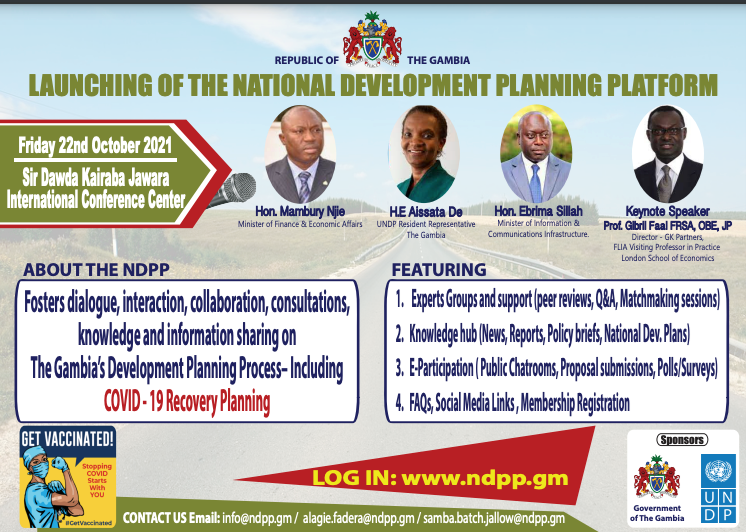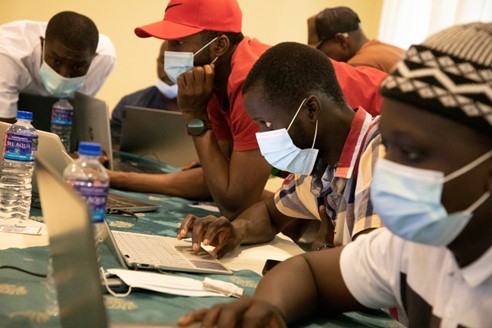Flyer for the launching of the NDPP platform
As the government of The Gambia prepares the successor to the current National Development Plan (NDP) and the country’s Long Term Development Vision (LTV), communications and digitalization have played a central role in the process. Sensitive to the “new normal” imposed by COVID-19, the UNDP The Gambia Accelerator Lab, together with the government, through the COVID 19 Recovery Secretariat of the Ministry of Finance and Economic Affairs, explored how to support the Directorate of Development Planning and make the formulation processes more inclusive for all factions of the society including non-literates and people with disabilities.
How it all started? When COVID-19 emerged in The Gambia, the issue of how to balance government service continuity on the one hand with adherence to COVID-19 preventive measures on the other, came to the fore of development practice. This assumed additional significance given that 2021 was a significant period in the Gambia’s development planning landscape as two critical planning documents were up for formulation. These were (i) a Recovery Focused National Development Plan to succeed the National Development Plan (2018 – 2021) and (ii) the Long-Term Development Vision 2050 to succeed the expired Vision 2020 blueprint.
Ordinarily and in keeping with The Gambia’s commitment to leave no one behind, the formulation process of these two national documents would involve the usual face to face consultations/dialogue aimed at gauging stakeholder perspectives. However, this was no longer possible in view of the physical distancing demanded by COVID-19 preventive protocols. Notwithstanding, it was imperative that multilevel and multiparty stakeholder consultations take place as anything less would have had significant negative implications for peacebuilding and social cohesion, community ownership, social inclusion, and overall sustainable development.
Digitalizing Civic Engagement. Innovation is often not thought of as originating from the public sector, which in an ideal context is responsible for creating the enabling environment wherein such innovation occurs. Nonetheless, public sector innovation is a necessity, not only because of a need to improve processes within the public sector for greater public service delivery, but also because its interrelation with the other sections of the economy requires some level of compatibility. The general interest with digitalization, efficiency, and speed, means that the only way for the public sector to respond is in kind, translating in corresponding and easy to use platforms.
To overcome the challenge of participatory formulation of development plans in a COVID-19 era, the potentials of ICT – particularly, virtual consultations mechanisms was harnessed, in a format that could well be the future of stakeholder consultations. This use of virtual platforms for community consultations will allow citizens, in their own time and in their own place, adapt to the new normal imposed by COVID-19, make their contributions and get involved with the planning and formulation process of the COVID-19 Recovery and the long-term Vision. Furthermore, the platform was envisaged to provide a comprehensive apparatus for consultations between Government and the diaspora who continue to evolve as a significant partner in development as exemplified by the recent doubling and now 30 per cent increase of contribution of remittances to the nation’s GDP.
Partnership for Results: In a perfect union between development managers and IT specialists, the platform was established over the course of 3 phases:
- Sensemaking Sessions
- Outreach and Communications component
- 3-day Hackathon to create web-platform
Sensemaking Sessions: The concept of the ndpp.gm platform was firmed up through a series of brainstorming sessions undertaken by actors drawn from the public sector, media, private sector, civil society, civic educators, UN, statistics and data institution, women representatives, and so forth. This multidisciplinary approach ensured no one was left behind and the platform catered for various end users. For effectiveness, the group was categorized into two, namely the technical team and the content development and communications team. The technical team laid the foundation for the frontend and backend development as well as management and maintenance of the platform. By the same token the content and communications team mobilized the information that would feed into the platform while also leading on a communications strategy for popularizing the use of the platform.
A critical feature that also emerged during this phase is the use of Use A.I. detection tools for keyword searches with Machine Learning, Chatbot, and data collection systems in place to capture views expressed by users of the IVR, voice calls and SMS short code facilities what formed part of the platform. This last group of facilities catered for users without access to or ability to use internet-based facilities.
Outreach and Communications Component: Key elements worked on during this phase are, multi-stakeholder engagement workplan to ensure continuous participation of all stakeholders throughout the virtual consultation process, information materials to be featured in the platform, methods and materials targeting various media outlets for public sensitization, outreach activities at national and local levels to sensitize citizens on the COVID-19 Recovery and Long-Term Development Vision 2050, as well as mechanisms to ensure outreach and the engagement of marginalized and vulnerable groups; women, youths, children, and persons with disabilities.
3-day Hackathon to create web-platform: This brought together the software developers from various government institutions known as the Gambia Application Development Team (GADT) along with AccLabGM and the content providers to create the platform, conduct a test run and further brainstorm on how to popularize the webpage. During this period, they created content related to among others things; user guidelines, policy briefs, opinion polls and surveys, upcoming events and webinars, knowledge hub, E-participation hub and experts group link.
Conclusion & Call to action. The ndpp.gm platform is a significant tool in The Gambia’s development planning scene and has added significant value to its processes. With a huge potential for up scaling and add-ons, this initiative will also build capacity within government and retain knowledge and skills for the progress of the platform for other uses. Ndpp.gm also avails users a one-stop facility on development planning and brings together its demand and supply elements in not only a static format but also an interactive format. Contributing knowledge, technical assistance and financial support, the critical role played by the Gambia’s UNDP Accelerator Lab and COVID-19 Recovery secretariat has once again, reaffirmed the value of UNDP’s integrator role and its championing of public sector innovations in The Gambia. Although not without challenges, such as high data costs, energy reliability, and digital literacy, the creation of the platform is a leap in the right direction to ensure vibrancy in the civic engagement space using a digital public good.
The nddp.gm platform is thus a great start, and indeed a significant milestone for the Directorate of Development Planning at the Ministry of Finance and Economic Affairs. Yet it is certainly not the final destination as it signals a huge reservoir of untapped potentials that the public, private and international development institutions can tap into in tandem for sustainable progress, peace and prosperity in The Gambia.
Visit www.nddp.gm to have your say.
Members of GADT hacking into the challenge

 Locations
Locations
